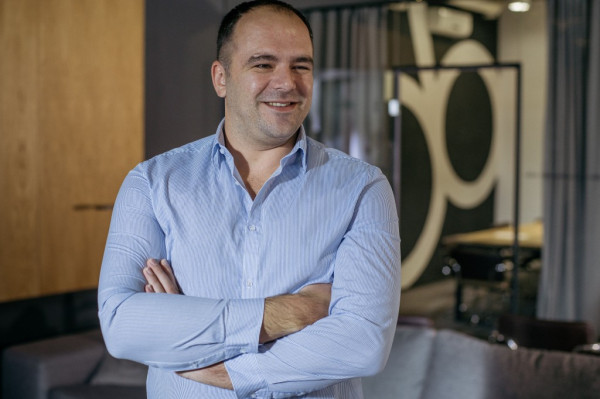
Company Interview with Ivan, CEO of Base B
What made you decide that there was value in the service you provide?
The idea of Base B emerged from a combination of a few factors. There were a lot of requests from people to help them set up a remote operation in Ukraine.
We realised that there is an obvious imbalance between talent needs and talent availability in certain industries. Added to that, the principal challenge and the value-added for the companies that were open to using remote talent was the setting-up process and operation of the remote base, and that’s exactly what we are experienced in.
Read 1 answer from other remote workers
What is the benefit of setting up remote teams for companies?
As long as we have the right people, and we know their qualities, remote work increases engagement and loyalty, and ownership of one’s work. As a result, the outcomes are better, and there is lower staff turnover.
Another advantage of remote teams is that they are quicker to set up because the availability of talent is higher in the countries in which we operate.
Remote engineering teams also bring a better culture of diversity and a better geographical spread for your company, which brings more ideas to the table. Lastly, the operational costs are lower, while the setup costs in terms of time and effort are close to zero for the client because Base B handles that.
Read 1 answer from other remote workers
What have been some of the challenges?
Base B, as a model, is a relatively new one, and whenever we are talking with potential customers, one of the first things that comes to their mind is some sort of outsourcing company—but we’re not an outsourcer.
We explain that it’s about allowing clients to have their own team, and that we’re not charging a markup on salaries or limiting communication because everyone we hire is a direct employee of the client.
We also spend time talking about how a remote team can be more effective. There is a school of thought in some businesses that an in-house team is more effective, when in fact, in-house teams are only effective because of the practices they use and the way they operate.
We exercise those practices with remote teams, meaning it’s like having an in-house team in every way except for the geographical location.
Read 13 answers from other remote workers
Do you have a hybrid or full-remote team?
Because we already had practices in place, as mentioned in the previous answer, and even though [at the time of writing, during the coronavirus quarantine period] we have gone almost full-remote, there hasn’t been a change in the way we work, compared to where our teams were working full-time within our hubs.
Read 12 answers from other remote workers
What are your company's most popular tools?
Working remotely requires communication tools, repositories, and collaboration tools. Depending on what we are doing specifically, the toolset may differ a little, but we’re all using Slack, Trello, and Jira, collaboration tools like Google Docs, and video call tools like Google Hangouts and Zoom for stand-ups as well as code repositories.
What’s more important is how you use the tools.
For example, it’s important to have video calls rather than just voice calls, especially when talking to a whole team.
Group calls give us all the chance to assess the reactions, and individual emotions, of the people you’re communicating with.
This is true even on calls where people are often trying to express a message without spending a lot of time talking, as is often the case with team and group calls.
The same, too, with Slack: there have to be strong communication policies when using it, to avoid the possibility of people just spamming others.
Read 12 answers from other remote workers
What does a typical day look like for your remote teams?
Generally, people come online, they check their Slack and their email, and they have a stand-up meeting where they discuss what the challenges or roadblocks are, and what they plan to do for the coming day. Most of the communication throughout the day will happen in Slack with occasional video calls.
Read 11 answers from other remote workers
How do you support or train your remote managers?
We provide full guidance and support for teams in collaboration with our clients, although right at the moment, our focus is on mentoring.
If a team member comes to us and says they want to do a specific course or a set of lectures, which require payment, we would be more than happy to facilitate that—whatever people feel is useful or valuable for them as a team.
We offer training on technical matters, but also on soft skills. This training especially highlights the key soft skills of developing the ability to work remotely and to manage remote teams.
For small teams, we prefer not to assign formal project managers, if possible. For teams of that size, we prefer to develop a team where each member has key responsibilities, with an account manager who can step in or discuss practices or methodologies where required.
We prefer setting up flat, functional teams, where the focus is on engagement, accountability, and sense of ownership.
Read 12 answers from other remote workers
Do you have a formal remote work policy?
We have flat teams, with each team member equally engaged and equally important to a project. Therefore we encourage people to work together closely and so that they can adapt easily to specific situations, especially those that involve remote work.
Read 11 answers from other remote workers
How has the role of HR changed when it comes to supporting your remote workforce?
Some of our clients come to us with a problem along the lines of, “I have this concept that I want to turn into a product,” and then we talk to them, identify what needs to be done, and we make suggestions as to what they need regarding their team.
If it’s a mature company rather than a startup, they might have more defined ideas in terms of how they want their team to operate, and if so, we’ll listen to their requirements, and suggest the kind of people on our local talent markets who would be of benefit to them in their team.
We then start recruiting the core of the team. For example, if they are looking for a technical lead, we look for someone with relevant domain experience and history of working in companies of similar stage and size.
Leadership qualities are the key to this core individual, as well as being product and solution-oriented.
Another example is that of an engineer. They might be a brilliant mind, with a deep interest in building algorithms, but we need to ensure that if, for example, our client is a startup, that each hire’s mentality fits the culture of the client.
We screen many people for a role, and in most cases, we interview at least ten people before presenting the first candidate for an interview with our client.
Read 10 answers from other remote workers
How do you build trust and camaraderie among your remote workers?
We build trust in teams by embedding transparency into our culture. What does this culture look like?
Well, we embrace taking risks and making mistakes, and we own the results, that’s the way people learn and develop. We are transparent about our goals and values.
We encourage open and constructive feedback. We also leave no room in our culture for workplace drama, and this is one of the core principles of our culture.
Read 12 answers from other remote workers
Do you facilitate opportunities for face-to-face interactions?
Our teams, under normal circumstances, meet face-to-face every day, and when that’s not possible, they use video calls. For our clients, we encourage travel, and for people to spend offline time together, to get to know the professional and non-professionals sides of their team members, which is something you can only find out by socializing with your team.
Whenever our client comes to the office, we ensure there’s the chance to work with their team to meet in the office. If a physical visit isn’t possible, we encourage our clients to have regular video calls and check-ins with their teams.
Read 11 answers from other remote workers
How has remote work impacted your company's productivity?
In our experience, because of the way we make sure people are engaged in what they do and the way they work, working remotely doesn’t change any of the ways that teams interact in a negative way.
They have the same resources available to them, and they can work together as a team in the same way.
Read 10 answers from other remote workers
What did we forget to ask Ivan Starodub?
At RemoteHabits we're always trying to improve our interviews, what question should we have asked Ivan Starodub?
Biography
Ivan Starodub
Ivan is an avid technology enthusiast with a proven track record of launching new products and services, and helping businesses grow through digital transformation and innovation. He has over 15 years of professional experience across a broad range of industries and technologies, focusing on solving complex business challenges using technology, research, and creative thinking.
About the company: Base B is a new company, which helps tech companies set up their own remote engineering base. This works the same way as if they decided to build an engineering team in another location, with the benefits of saving on costs and knowledge of the local market.
The advantage of this for clients is that it gives them access to a talent pool of more than 500,000 qualified software engineers in Ukraine and Poland. Base B also says it will help reduce the time to close a position by at least 60%, compared to what it takes in, for example, the Bay Area.
Work remotely? Share your story on RemoteHabits!
Want to be interviewed? If you have a remote position, head over to the interview me page!
Looking for a remote job?
RemoteHabits Jobs has everything you need to find your next great remote work position!
Related Interviews
Company Interview with Fraser, Global Head of Marketing at AnswerConnect
Friday newsletters, instant access to HR, & the use of GIFs in comms, Fraser and the AnswerConnect team could write a book on remote work best practices. Check out the process of how they make it all work.
Interview with Jake, a customer success manager for Atlassian
Jake was burned out on the San Francisco lifestyle—see how he transitioned from working in-office to working remotely for a remote-friendly company.
Interview with Shauna, founder and business consultant specializing in remote work
Shauna is a consultant that guides companies in thriving while remote—see her advice for staying grounded as a remote worker.

